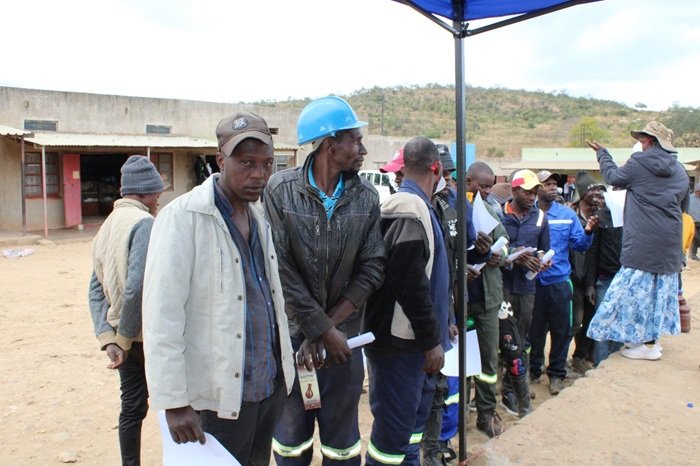TheUnion Zimbabwe Trust (UZT), with funding from the Stop TB Partnership (Global), has launched an innovative tuberculosis (TB) screening outreach programme aimed at boosting early detection and treatment in high-risk artisanal mining communities in Mberengwa and Zvishavane The initiative employs a mobile outreach model, featuring ultra-portable digital X-ray machines enhanced with CAD-AI (Computer-Aided Diagnosis) technology This allows for real-time interpretation of X-ray images to detect abnormalities suggestive of TB and silicosis The programme also includes rapid field specimen testing for diagnosis and integrates screening for other health conditions such as malnutrition and alcohol-use disorders—bringing comprehensive services closer to those most in need
Screening outreaches are conducted at artisanal small-scale miners’ (ASM) workplaces during the day and at social drinking spots in the evenings, in what are termed “moonlight screenings.” These are complemented by routine community screenings carried out by trained community health workers, as well as facility-based screenings at primary health centres where access to diagnostic tools is limited We are here to launch a game-changing project in the diagnosis of TB and silicosis, particularly in mining communities like these,” said Dr Mary Muchekeza, Midlands Provincial Medical Director, during the inaugural screening outreach at Vanguard Business Centre in Mberengwa District “I understand how busy miners are—that’s why we’ve brought theX-rayto you If you’re asked to submit sputum for testing, it will be processed here on-site
This drastically cuts the time people used to wait for diagnosis, ensuring faster access to care and treatment.”
The programme is currently being rolled out in two TB high-burden districts of Midlands Province—Mberengwa and Zvishavane—chosen for their significant ASM activities Interventions are focused on 25 health facility catchment areas across the two districts UZT Executive Director,Dr Ronald Ncube, said that traditional TBscreening methods often rely on passive case finding, where individuals present themselves at health facilities This approach, he said, misses high-risk groups such as ASMs, people in remote communities, or those battling co-morbidities like alcohol-use disorders or malnutrition
“What sets this model apart is its integration of TB screening with services for silicosis, malnutrition, and alcohol-use disorders It offers comprehensive care closer to where people live and work By shifting from a passive, facility-based approach to a proactive, integrated community model, we hope to detect more cases earlier and ensure timely access to care,” said Dr Ncube So far, 270 community and healthcare workers have been oriented and trained across five clusters and 25 health facilities to support the roll-out, community mobilisation, and screening efforts
To date, two screening cycles have been conducted—representing four out of 33 planned outreach campaigns In Mberengwa, outreach was conducted at Vanguard and Neta business centres, B-Mine, and Mberengwa Turn-Off In Zvishavane, outreach covered Gudo and Vugwi clinics, Samanye, Canada 64, Dhibha, and Zuderburg mining areas Of the 999 clients initially screened by symptoms, 925 underwent X-ray screening
A total of 271 specimens were collected and processed, resulting in the diagnosis of 10 individuals with TB, 6 with silicosis, and 4 with both TB and silicosis (Silico-TB)—underscoring the urgent need for integrated diagnostic approaches “We are happy to be one of the districts implementing this project It’s a chance to improve TB case finding in our communities Given its design, the programme empowers communities and brings us a step closer to a TB-free Zimbabwe,” said Nkulumo Ncube, Zvishavane District TB and Leprosy Coordinator
Source: Health Times
All Zim News
All Zim News is a central hub for all things Zimbabwean, curating news from across the country so no story is missed Alongside aggregation, our team of nationwide reporters provides real-time, on-the-ground coverage Stay informed and connected — reach us at admin@allzimnews.com.
Source: Healthtimes
